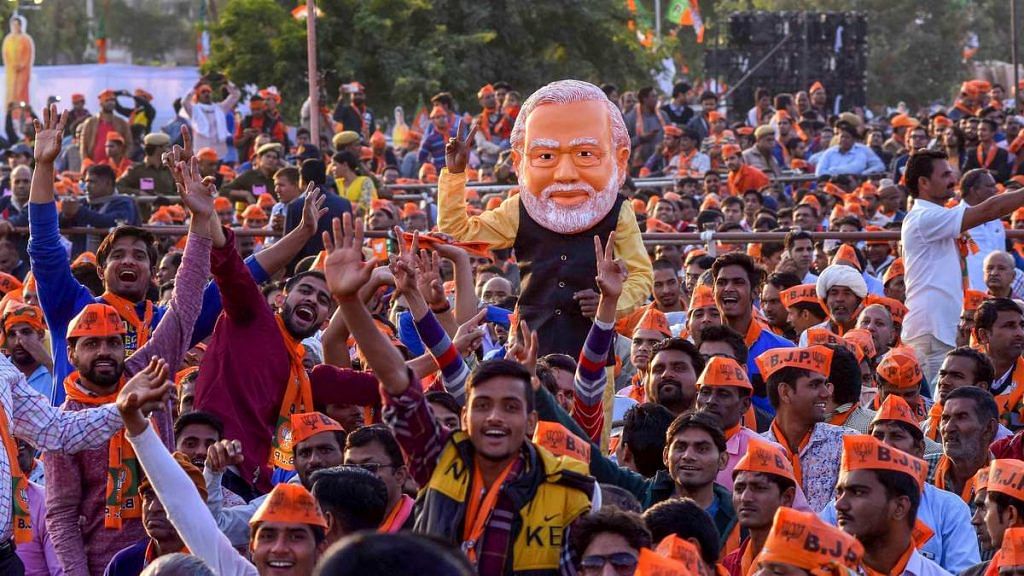New Delhi: Over 300 academics from 30 universities across 15 Indian cities, including JNU and IIT, came together this week for a shared cause — bringing Narendra Modi back for a second term as Prime Minister.
The group calls itself ‘Academics4NaMo’, and seeks to hold meetings and debates to dispel the “negative notions” surrounding Modi, and inspire their colleagues from academia to put their weight behind him.
The initiative is aimed at easing the somewhat uneasy relationship the Modi government has shared with the Indian academia, largely seen as a Left bastion, with issues like the intolerance debate and the JNU sedition row often pitching the two sides against each other.
Among other issues, the group will highlight how the government issued an ordinance Thursday to junk a controversial quota formula that critics said would have vastly reduced the number of faculty jobs for SC/STs and OBCs at universities.
Also read: The IITs have a long history of systematically othering Dalit students
‘He has done a lot for women and the poor’
Academics4NaMo draws members from some of the titans of Indian higher education, including Jawaharlal Nehru University (JNU), Indian Institute of Technology (IIT), Delhi University (DU), and Banaras Hindu University (BHU).
One of its members, Vandana Mishra of JNU’s School of International Studies, told ThePrint that she supported Modi because he had launched several initiatives that empower women.
“We want to garner support for Narendra Modi from the intellectual fraternity because he has come up with many initiatives for women from different sections, including the Ujjwala scheme [subsidised LPG connections to eliminate dependence on polluting cooking fuels] for poor women, six-months’ paid maternity leave, and commissioning of women in the forces,” the professor said.
Her colleague, professor Sudhir Pratap of JNU’s School of Languages, added that “Modi has empowered each and every section of society and also secured our border”.
“He has ensured empowerment, education, employment and entrepreneurship through reservation, representation and recognition,” he said.
For R.S. Kureel, the retired vice-chancellor of two universities — Narendra Dev University of Agriculture and Technology, Faizabad (now Ayodhya) and Dr B.R. Ambedkar University of Social Sciences, Indore — and a former director at the Union Ministry of Agriculture, Modi’s appeal lies in his government’s pro-poor policies.
“He (Modi) has done a lot for the emancipation of women and the poor through his policies and schemes,” he told ThePrint.
“He is good for national integration. This is the first time India has done what it needs to do to keep its integration strong,” he added.
Rakesh Upadhyay, the chair professor for Indology at BHU, said the Left ideology had dominated academics “for a long time”.
There is a class of intellectuals that stands against Modi, he added, and needs to be countered.
“The award wapsi gang and the likes have dominated the space for long,” he said. “It is time to stand in support of Modi and let generations remember the lost pride in our cultural heritage,” he added.
The “award wapsi gang” Upadhyay cited are the prominent academics who returned their state honours to protest against the violence inflicted on Dalits and Muslims by cow vigilantes, and what they described as a deepening communal divide under the Right-wing Modi government.
Other wrangles have included the death of University of Hyderabad PhD scholar Rohith Vemula, a Dalit student who committed suicide in January 2016 over alleged caste discrimination by the institution’s administration.
He and four others had been suspended and expelled from the hostel following a clash with members of the Akhil Bharatiya Vidyarthi Parishad (ABVP), the RSS’ student wing, after the Union government reportedly intervened on the latter’s behalf.
Hundreds of academics had also protested against the JNU sedition row, which saw students of the university booked for sedition over a rally in support of Parliament attack convict Afzal Guru amid claims that some participants had raised “anti-India” slogans.
Also read: How PM Modi transforms into campaigner Modi as he mixes official trips with politics
No one architect
Members of ‘Academics4NaMo’, launched Tuesday at Ambedkar International Centre, Delhi, in the presence of several academics, will pursue their cause by explaining to peers the stance of the BJP and its affiliates, saying their outreach will be aimed at “academicians, intellectuals, scholars, journalists, panelists, columnists and thinkers”.
“The outcome of this election could spell the difference between a surging, ambitious new India or the India of the past steeped in corruption and hopelessness,” reads the introduction of the group on their Facebook page.
“We are reaching out [to] various communities — the thought leaders and torchbearers of our country — to lend a helping hand in this battle,” it adds.
No one person heads the group, said DU assistant professor Swadesh Singh, adding that it was the brainchild of a few members, including him. Apart from debates and meetings, the group will also take its message across through online interactions, while using the platform to publish and circulate articles and opinions.
